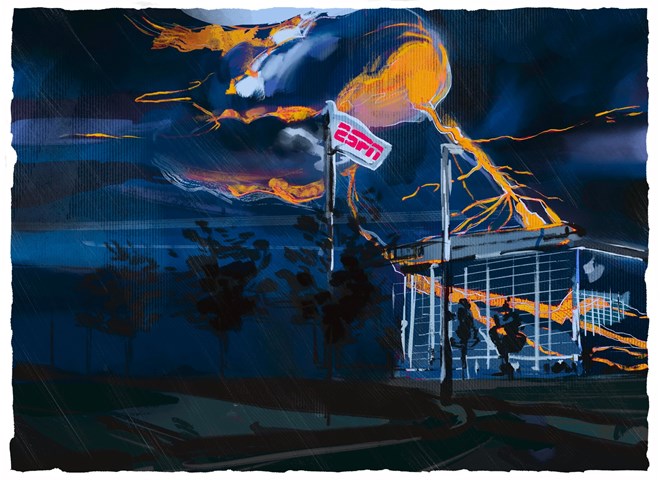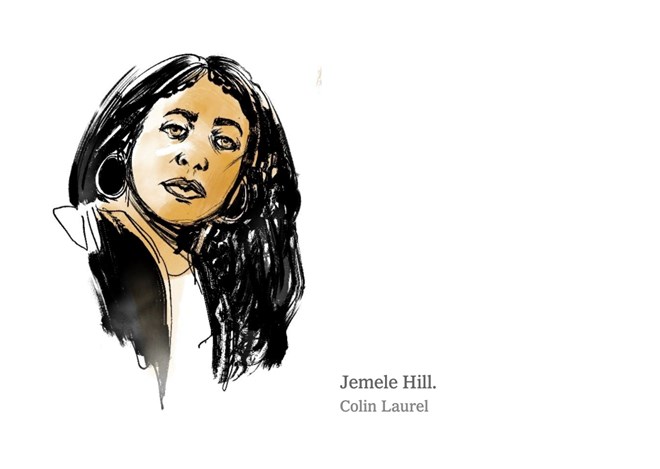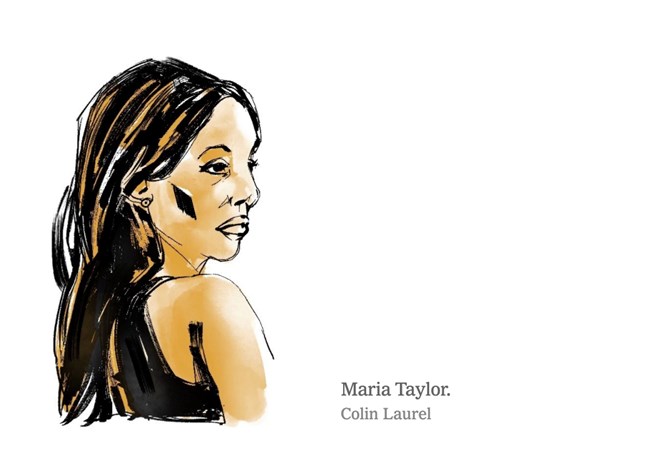
By Kevin Draper
Tuesday July 14, 2020
In meetings and conversations among colleagues, ESPN employees have criticized the career pipeline and diversity of top leadership, eliciting a promise from executives to do better.

Colin Laurel
The nationwide conversation over systemic racism and equality has prompted a series of discussions and forums at ESPN, where Black employees, many of them behind the cameras, have begun speaking out about the everyday racism and barriers they face at the sports media giant.
In conference calls and meetings over the last month, they have detailed to their bosses and colleagues what they see as behavior and long-entrenched practices that have led to embarrassing missteps and kept many career Black employees from rising through the ranks at a company that devotes a significant amount of its coverage to Black athletes.
A key producer of some of ESPN’s signature shows said she watched others be promoted so often that she advised some fellow Black employees to leave the company to advance their careers.
ESPN has apologized twice in recent years for on-air segments that were criticized by employees and viewers as racist, including one that looked uncomfortably like an auction of enslaved people.
And the story of one incident last month has ricocheted around ESPN, with several Black employees calling it emblematic of their experience at the company.
On a conference call of more than 200 people to discuss college football coverage, Black employees began sharing their personal experiences with discrimination. As Maria Taylor, a fast-rising star who has hosted several shows, spoke about her treatment at ESPN, she was interrupted by a white male play-by-play announcer who apparently did not realize that his microphone was not muted.
The announcer, Dave LaMont, could be heard complaining to someone that the call was just a griping session for Black employees.
“It was such a slap in the face,” Taylor said in an interview. “When I was in it, that was horrible. But now, looking back, it was an awakening moment. This is part of our culture. There are people that feel this way.”
When asked about the call, ESPN said it had “addressed it appropriately,” without elaborating.
Reached before publication of this article, LaMont declined to comment. After it was published, LaMont said in an email that he did not “demean the nature of the phone call” and apologized for the interruption. He said his exact words on the call were: “This call is not about college football. People are venting.”
Jimmy Pitaro, ESPN’s president, acknowledged that the company was not where it wanted to be on diversity, especially behind the camera, and said a frequent topic of conversation was how to make ESPN more “relevant” to people of color. “We cannot have rooms full of just white decision makers,” he said. “Our execs and employees need to reflect the audience that we are trying to reach.”
In interviews, more than two dozen current and former ESPN employees, including many who spoke on condition of anonymity because they feared punishment, described a company that projected a diverse outward face, but did not have enough Black executives, especially ones with real decision-making power. They said the company did not provide meaningful career paths for Black employees behind the camera and made decisions based on assumptions that its average viewer is an older white man, in spite of its audience trends.
ESPN acknowledges hiring shortfalls, but points to corporate America.
As ESPN grew into a sports media powerhouse in the 1990s, its executives remained almost exclusively white and male.
John Skipper, who was ESPN’s president until 2017, recalled a meeting of the company’s senior staff around 2000, when he was in charge of ESPN the Magazine. Kerry Chandler, a Black woman who was then a senior human resources executive, led a vigorous discussion about diversity. Besides Chandler, Skipper could not remember another nonwhite person in the meeting.
“Twenty-two out of 25 were white men, including me, of course,” he said, making it clear he was speaking about his time at ESPN.
Twenty years later, the company’s executive ranks look different, though the biggest difference is the elevation of white women. ESPN declined to provide figures on the racial composition of its executives, but said 25 percent of the people who report directly to Pitaro are Black, all men.
Each of those Black executives had at least a 20-year career before joining ESPN, while a number of senior white executives have only ever worked at ESPN, suggesting to many Black employees a limited career path for them at ESPN. One former midlevel employee who is Black and spoke on condition of anonymity to not jeopardize relationships in the industry said she searched for a new position within ESPN and did not want to leave the company, but no executive made an effort to retain her.
After being contacted for this article, ESPN made four Black senior executives available for interviews: Rob King, Kevin Merida, Dave Roberts and Paul Richardson. A representative from ESPN’s communications department was present for each interview, as well as every other on-the-record interview conducted with a current employee.
King, Merida and Roberts each oversee various content arms, while Richardson is the head of human resources. In those interviews, all four executives said that ESPN’s executive ranks were not diverse enough, but mostly attributed that to a larger problem in corporate America. They all said every one of the company’s senior leaders believes in diversity and inclusion.
“Like most media companies, including the one you write for, there was a time when you didn’t have African-Americans in editorial positions that could grow from entry level to the highest potential levels of the company,” said Roberts, who joined ESPN in the mid-2000s as a coordinating producer. He believes ESPN’s Black senior vice presidents “can help continue to evolve and change and grow the process and progress of diversity.”
Black on-air employees were much more direct about what they believe are ESPN’s failings. “So many of the Black people we have at ESPN have been worthy of promotions and other opportunities long before this happened,” said Michael Eaves, a “SportsCenter” anchor, referring to the death of George Floyd in Minneapolis police custody, an event that is powering a movement against police brutality and racial injustice.
Even powerful employees who largely had good things to say about the company’s record on diversity believed there were areas where ESPN had fallen painfully behind. “There are certain things that should have been done years ago,” said Stephen A. Smith, perhaps the network’s biggest star. He said that for years he has pointed out to ESPN leaders that its executives overseeing N.F.L., N.B.A. and M.L.B. programming are all white.
“There are a plethora of people that have come through ESPN that I thought could do some very positive things for ESPN about that bottom line,” Smith said. “They happened to be Black, and I don’t believe they have been put in those positions.”
Other current and former Black ESPN employees described active discrimination.
Cari Champion worked at ESPN for eight years, including several hosting “SportsCenter,” before leaving this year. She said that while the company gave her an unrivaled platform, she left in part because of “constant dismissals and borderline harassment” from Jill Fredrickson, a senior executive she reported to.
Champion described hearing “microaggressions and dog whistle words,” saying such “subtleties are racism in corporate America.”
In an interview, Fredrickson declined to directly address her relationship with Champion. She said she thought Champion had been heard, and that she “always wanted to have an open dialogue to her.” She continued, “I thought that she left amicably.”
‘There are white people that don’t have her résumé.’
ESPN presents a fairly diverse face to the outside world across its slate of programming, and its news editors and reporters are more diverse than most of its competitors and sports departments in newsrooms nationwide. A 2018 report found that ESPN employed a significant percentage of the country’s Black, Latino and female assistant sports editors and columnists.
But current and former employees say that things are very different behind the camera.
Richardson said that the retention rate for Black employees is high, but not as high as it is for white employees. He attributed the difference to some Black employees not wanting to live in Bristol, Conn., where ESPN has its headquarters, as well as aggressive poaching by competitors.
There was no sign, he said, that Black employees found ESPN unwelcome. But that conflicts with how many employees described their own experiences.
In a staff meeting last month, it was pointed out that of more than 40 people on the call, including a top executive, there was only one Black employee, a Somali-American coordinating producer named Amina Hussein.
According to two people on the call, Hussein told leaders that she had mentored many younger Black employees, but lately had told some that their career advancement prospects would improve if they left the company. She declined to discuss the call for this article.
Hussein has overseen “Sunday NFL Countdown” and “NBA Countdown,” two high-profile programs on ESPN. Still, she was not offered a promotion in over a decade. She became a coordinating producer in 2008, the same year as Lee Fitting, a white man. Fitting has since risen several levels above Hussein to oversee all N.F.L. and college football coverage.
“If Amina was a white person she would be V.P.,” said Jemele Hill, who hosted a number of shows on ESPN before leaving in 2018. “There are white people that don’t have her résumé.”
Hussein was promoted in July to senior coordinating producer.
Employees see the problems as enduring, not new.
Black ESPN employees repeatedly brought up the experience of Hill and Michael Smith, who were made “SportsCenter” hosts in 2017 and tried to bring an unapologetically Black spirit into the meat-and-potatoes highlight factory that is “SportsCenter.”
The show was quickly tagged as “too political” and met fierce resistance inside ESPN.
“Pretty quickly, that was a show that people internally criticized,” Skipper said. “We had plenty of times where we had shows that didn’t work with nondiverse talent on them, and people never said, ‘You went too far with those two white guys.’”
Norby Williamson, a white senior executive, was put in charge of the show, which Hill said was a signal that its days were numbered. After Hill and Smith left it, and eventually ESPN, Williamson began remaking “SportsCenter” in a much more traditional direction, an effort The Washington Post reported on in 2018.

While executives inside ESPN saw the profile as a success, Black employees noticed a photograph of a staff meeting in the article that contained a sea of white faces. They read his quotation — “Never forget: I’m the person you have to serve here” — and wondered what that said about ESPN’s priorities.
ESPN said the photograph did not represent the diversity of the call, in which 180 people had been invited, many of them participating remotely. “I’m proud of actually how exceptionally diverse it is,” Williamson said. “I am sorry people interpreted that and took that away.”
The network has changed its approach to covering unrest among American athletes.
Over the last several months, as games have been largely suspended because of the coronavirus pandemic and as athletes have spoken about racism, ESPN’s television programs have been dominated by discussions of police brutality, racism and white privilege. Last week, the Walt Disney Company, which owns ESPN, signed a deal to produce shows with Colin Kaepernick, the former N.F.L. quarterback, that included Hill as a producer.
Given how purposefully ESPN has sought to shed the label that it is “too liberal” and avoid the wrath of the president’s Twitter account after the bruising battles of 2017, the shift in tone has been stark.
ESPN’s position is that it has always sought to avoid “pure politics” while aggressively covering the intersection of sports, politics and culture. Executives pointed to The Undefeated, an ESPN site that covers race that has grown in importance over the years and is a part of the Kaepernick deal. The recent programming, executives said, simply reflects the upheaval in the sports world.

Some employees aren’t buying that explanation. “It is interesting because I was on ‘Get Up’ when there were certain stories about Colin Kaepernick, would he have a workout or a tryout, and to be honest it would be a voice-over and no discussion,” Taylor said. “Virtually every other question could be discussed.”
A number of other employees described being told in various ways to tone down or skip their on-air coverage of sports and race. “It was never explicit, it was just sort of us reading the room,” Elle Duncan, a “SportsCenter” anchor, said.
The company has pledged changes.
Pitaro, the ESPN president, has laid out a series of changes. He said that ESPN would have more diverse meetings and ensure all voices were included, that interview and hiring practices would be improved, that leadership development would be strengthened and new employee programs reviewed, among other changes.
“We are going to speak through our actions here, and we are going to improve,” Pitaro said. “If we don’t, it is on me, I failed, because it does all start with me.”
Current and former employees expressed mixed opinions about the prospect for change. Many believe their concerns rank lower in his priorities compared with maintaining relationships with sports leagues and Disney, the corporate parent. Much of the day-to-day running of ESPN, they said, falls to senior executives and others below him who do not share his priorities.
“I am confident that based on the conversations that I am having daily, that leaders across ESPN understand the importance of diversity and the urgency here,” Pitaro said.
Duncan has been a part of a group of Black employees who have been meeting with a top executive since the beginning of the year about increasing the company’s diversity beyond on-air talent. She expects there will be pushback, but the executives she has spoken with are genuine in their desire to change the company.
“I truly, truly, believe ESPN wants to be on the right side of history,” she said.